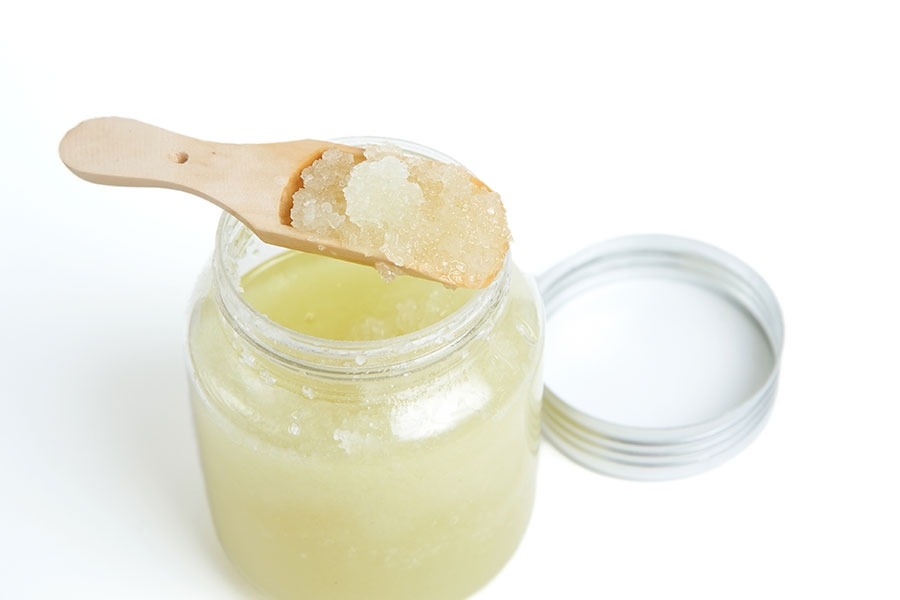4 Basic DIY Scrub Recipes
Written by Sasha WardFor exfoliation straight from the kitchen cupboard, some clients may turn to making their own DIY scrubs. Here are four quick recipes that clients can make in the comfort of their home – quickly and with no fuss.
THE BASICS
A basic scrub consists of an exfoliant, carrier oil, and aroma. The exfoliant is usually a gritty substance of some sort. The carrier oil is also known as a base oil. The oil in a homemade body scrub holds the mixture together, as well as moisturizes the skin. A typical safe ratio is one-third cup of oil for each cup of exfoliant. There are many carrier oils to choose from. Unless their skin is very dry, clients should choose an oil with a fairly thin consistency, so that it will wash off easily and will not leave the skin feeling too greasy. As for aroma, the easiest way to scent the body scrub is with essential oils. Clients should avoid fragrance oils which are synthetic. Each combination followed is intended to be diluted in one-third cup of carrier oil. When the scrub is washed off, it is a good idea to put a drain stopper in. This will allow the fallen exfoliant or oil to be tossed out in the trash, instead of it flowing down the drain for potential blocking.
THE HEALER
Oatmeal is the gentlest of the exfoliants. It is an emollient, meaning that it softens and hydrates skin. People have used it for decades as an effective home remedy for dry, itchy skin. It is excellent on eczema, psoriasis, dermatitis, chilblains, and sunburn. Unlike salt or sugar, it can be used with water instead of an oil.
Almonds or ground almonds have a softening effect on the skin. Those with nut allergies should avoid using them, however. Other options include almond meal, flax meal (ground linseeds), rice bran, wheat bran, and ground nut shells.
Coconut oil is an emollient and will nourish the skin, even with its thin consistency. If cold pressed, it will need to be melted first (in the microwave) before being added to the scrub mixture.
Macadamia nut oil has a nutty odor and thick consistency, so it is best before bed, as it will leave an oily film on the skin. It is recommended for dry skin. Its shelf life is 12 months. Three to eight drops rose, six drops of roman chamomile, or six drops of cypress are perfect for broken capillaries because of their healing properties.
Three to eight drops of sandalwood, six drops of geranium, and six drops of rose are great for dry skin. And, three to six drops of roman chamomile, four drops of rose, and two drops of neroli are nice and gentle for those who are prone to be sensitive. Last, rose, sandalwood, and patchouli work wonders on dehydrated skin.
Additional extras include: vanilla, which has antibacterial properties that help cleanse the skin and healing properties help to heal burns, cuts, and wounds; and nutmeg, which is an effective sedative. Used to treat inflammation and pain, nutmeg helps to create a smoother and healthier appearance by helping to treat several skin problems, including reducing the appearance of blackheads, acne marks, and scars. As a direct treatment, nutmeg powder can be added to some honey to make a paste that can be applied to acne marks to help resurface the skin. Please note, nutmeg is not safe to use during pregnancy.
THE REVITALIZER
Salt is great for relaxing the muscles. Some people prefer to use sea salt because it is less processed than table salt, contains a wider variety of trace elements and minerals, and is said to be kinder on the skin. Sea salts, table salt, and Epsom salts are all fine. Whatever salt is used, it should be finely ground to a similar consistency to table salt, because course grains can feel a little too exfoliating. Sunflower oil has a very faint odor and thin consistency and penetrates well without leaving much of a residue. It is also one of the most affordable oils and has a shelf life of about 12 months. Three to 10 drops of geranium, six drops of rose, and four drops of cypress help rejuvenate devitalised skin. Additional extras include thyme and ginger. Thyme is anti-inflammatory and antibacterial and is rich in vitamin A. Ginger is also anti-inflammatory and antioxidant and is used to decrease muscle soreness and inflammation within muscle fibres and to relieve osteoarthritis pain.
THE REGENERATION
Ground coffee caffeine is a vasoconstrictor, meaning that it causes blood vessels to constrict, so it can temporarily reduce varicose veins and rosacea. Sweet almond oil has a slightly sweet and nutty aroma and medium consistency, but absorbs fairly quickly. Shelf life is about 12 months. Hazelnut oil has a sweet nutty odor, is quite thin, and leaves a thin film on the skin. Shelf life is about 12 months. Neroli, frankincense, and ylang-ylang are perfect for age support. Honey is antioxidant and antimicrobial and is rejuvenating and refreshing, for depleted, lackluster skin. It has great absorption and retains moisture well for plumping in fine lines and wrinkles.
THE BALANCER
Sugar is more refined and feels slightly gentler on the skin than salt. It is a great alternative for more sensitive skin types but for those who want a more thorough exfoliant than something like oats or almonds. Sugar will also have an emollient effect, as well as desquamating. Grape seed oil has a faint sweet odor and very thin consistency and leaves a thin film on the skin. Shelf life is between six to 12 months. Sandalwood, lemon, and lavender are great on oily skin, balancing natural sebum levels. Cinnamon has antiparasitic, antifungal, antiseptic, and antibacterial properties. It keeps the skin clean and protected. Cinnamon is used to treat acne and eczema, as it helps stimulate blood vessels, bringing blood, nutrients, and oxygen to the surface of the skin, essential for repair work.
The information provided above should be applied in specific measurements in order to avoid irritants towards the skin. Clients should research appropriate measurements, and should not experiment, for best results.
 Sasha Ward is a professional spa therapist specializing in touch therapy, Indian head massage, and remedial massage from Wiltshire. She has five years of experience working in the spa industry through hospitality, academic, and self-employed fields. Ward is a previous associate of FHT for two years and writer for travel wellness blog, The Best Of Spas.
Sasha Ward is a professional spa therapist specializing in touch therapy, Indian head massage, and remedial massage from Wiltshire. She has five years of experience working in the spa industry through hospitality, academic, and self-employed fields. Ward is a previous associate of FHT for two years and writer for travel wellness blog, The Best Of Spas.
